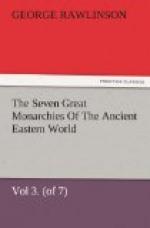But in the affairs of nations, as in those of men, negligence often proves fatal before it can be repaired. Cyrus saw his opportunity, pressed his advantage, and established the supremacy of his nation, before the unhappy effects of Astyages’ peace policy could be removed. He knew that his own Persians possessed the military spirit in its fullest vigor; he felt that he himself had all the qualities of a successful loader; he may have had faith in his cause, which, he would view as the cause of Ormazd against Ahriman, of pure Religion against a corrupt and debasing nature-worship. His revolt was sudden, unexpected, and well-timed. He waited till Astyages was advanced in years, and so disqualified for command; till the veterans of Cyaxares were almost all in their graves; and till the Babylonian throne was occupied by a king who was not likely to afford Astyages any aid. Ho may not at first have aspired to do more than establish the independence of his own country. But when the opportunity of effecting a transfer of empire offered itself, he seized it promptly; rapidly repeating his blows, and allowing his enemy no time to recover and renew the struggle. The substitution of Persia for Media as the ruling power in Western Asia was due less to general causes than to the personal character of two men. Had Astyages been a prince of ordinary vigor, the military training of the Medes would have been kept up; and in that case they might easily have hold their own against all comers. Had their training been kept up, or had Cyrus possessed no more than ordinary ambition and ability, either he would not have thought of revolting, or he would have revolted unsuccessfully. The fall of the Median Empire was due immediately to the genius of the Persian Prince; but its ruin was prepared, and its destruction was really caused, by the shortsightedness of the Median monarch.



